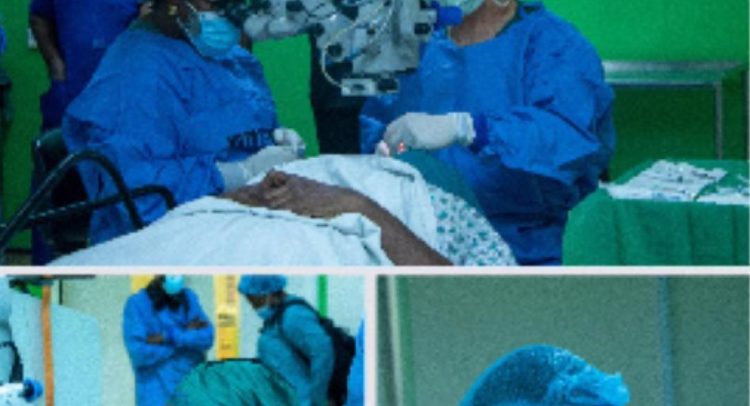The doctors performing the surgeries.
The Eye Centre of the Korle Bu Teaching Hospital (KBTH) has successfully conducted cornea transplant surgeries for six patients with vision impairment.
The surgeries were to correct blurriness and restore their vision through the replacement of either part or the whole cornea with free donated cornea tissues from the United States.
The team of surgeons, led by Dr. Geoffrey Tabin, Professor of Ophthalmology and Global Medicine at Stanford University with a three-member eye specialist team from KBTH conducted the two-hour procedure, each performed in two different batches.
The procedure is the third to be conducted under a partnership between the KBTH and the Himalayan Cataract Project (HCP)-Cure Blindness aimed at establishing a sustainable eye care infrastructure and reducing blindness in developing countries.
The partnership invests in specialised training opportunities for ophthalmic personnel through hospital-based programmes, sponsored medical equipment procurement and surgical outreaches across sub-Saharan Africa.
Speaking with journalists after the procedure at the KBTH, Dr. Tabin said cornea transplant is one of the common procedures used in advanced countries to reduce the prevalence of blindness.
“This procedure restores sight to blind people, with eyes donated by people who recently passed away. In the US, we conduct about 45,000 cornea transplants annually, but that is not available across sub-Saharan Africa.
Kenya tried establishing one but was not successful. As a result, patients needing this procedure have to travel to India, America, and other countries to undergo such surgery and the cost of one tissue is about 2,000 dollars,” he noted.
He said a key element for performing a cornea transplant was the availability of “eye banks” where cornea tissues of dead persons were harvested and stored for future use.
According to Dr. Tabin, a lot of blindness among the Ghanaian populace could be averted should the country have such infrastructure in place as there were highly skilled and qualified ophthalmologists to perform the procedure.
He said a lot of people have had their eye through this gift which is the front window to the eye. “If people can donate corneas, that can be of great service to many young men and women suffering blindness in the country.”
Consultant Ophthalmologist, Dr Gladys Fordjour, who was part of the team disclosed that the Unit had “a long list of people awaiting cornea surgeries with 30 people booked for the procedure at present.
She said about nine per cent of blindness recorded in Ghana was due to cornea scars, urging the public to take good care of their eyes as stakeholders take steps at considering the establishment of eye banks.
“Every red eye is an emergency and you should have it checked. If there is a family history of blindness you need to have the eyes checked periodically, at least every two years at age 30 to 40 onwards, and do not put anything into the eye if it has not been prescribed,” she advised.
Chief Executive Officer (CEO) of KBTH, Dr. Opoku Ware Ampomah, said a “Tissue Transplantation Act” in Ghana was needed as soon as possible to allow for the safe harvesting and storage of human organs for transplant activities to save lives.
The cornea is a clear outer layer at the front of the eyeball and acts as a window to the eye.
A cornea transplant is a surgical procedure to remove all or part of a damaged cornea and replace it with healthy donor tissue.
A cornea transplant is often referred to as keratoplasty or a corneal graft.
It can be used to improve sight, relieve pain and treat severe infection or damage.
By Jamila Akweley Okertchiri


